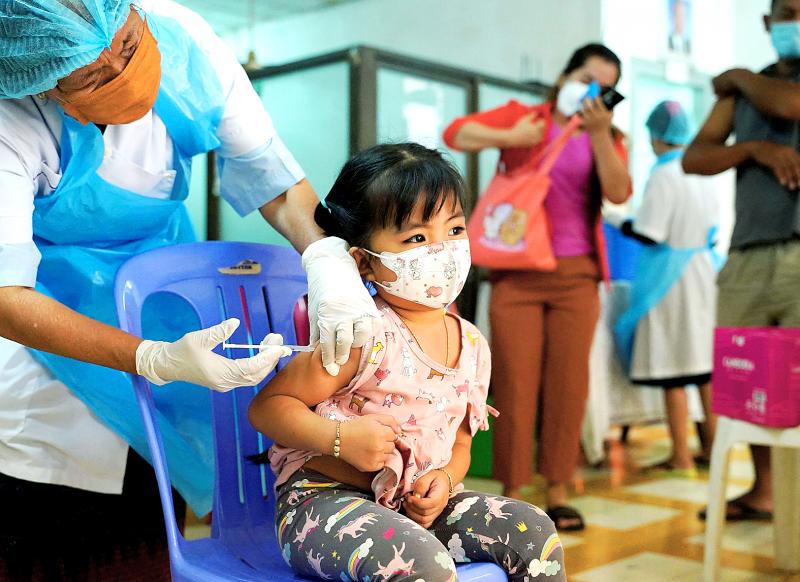Elementary school-aged children produce about four times fewer aerosol particles when breathing, speaking or singing compared with adults, which could help explain why they seem to be at lower risk of spreading COVID-19.
Various studies have suggested that young children are about half as susceptible to catching COVID-19 as adults, and, despite carrying a similar amount of virus in their noses and throats, appear to pass it to fewer people if they do become infected.
One possibility is that the size and shape of their lungs and respiratory tracts means they emit fewer tiny airborne droplets called aerosols as they breathe and speak.

Photo: Reuters
These particles can linger in the air, particularly in enclosed spaces, such as classrooms, so fewer aerosols could mean other people are less likely to be infected if they also occupy those spaces.
To investigate, Mario Fleischer at Charite University Medicine Berlin and colleagues recruited 16 healthy children aged eight to 10, and used a laser particle counter to measure how many aerosol-sized particles they emitted when breathing at rest, and during speaking, singing and shouting.
The results, published in the Journal of the Royal Society Interface, suggested that shouting produced the most particles, followed by singing, speaking and then breathing.
However, particle emission rates and volumes for singing, speaking and breathing were about four times lower for children, compared with measurements taken from 15 adults.
“More precisely, children emitted [particle rates and emissions] during speaking of the same order of magnitude as adults breathing, and while singing, they emitted similar [particle rates and volumes] to the adults while speaking,” Fleischer said.
However, the amount of aerosols produced during shouting was more similar between adults and children.
The authors also said that there was considerable variation between individuals and their results did not suggest attending schools or after-school clubs was without risk.
“Especially in constellations with high vocal loudness, which are common in the everyday life of children and adolescents, the aerosol emission could be similar for different age groups, as the measurements for the shouting condition show,” Fleischer said. “On the other hand, singing and talking at volumes typical for children might be less restricted if the time frame is limited, like in common school and extracurricular settings.”
He added that other factors, such as the number of children and the design of indoor ventilation, also mattered, and that further research was needed to inform any recommendations made to schools.

Kehinde Sanni spends his days smoothing out dents and repainting scratched bumpers in a modest autobody shop in Lagos. He has never left Nigeria, yet he speaks glowingly of Burkina Faso military leader Ibrahim Traore. “Nigeria needs someone like Ibrahim Traore of Burkina Faso. He is doing well for his country,” Sanni said. His admiration is shaped by a steady stream of viral videos, memes and social media posts — many misleading or outright false — portraying Traore as a fearless reformer who defied Western powers and reclaimed his country’s dignity. The Burkinabe strongman swept into power following a coup in September 2022

‘FRAGMENTING’: British politics have for a long time been dominated by the Labor Party and the Tories, but polls suggest that Reform now poses a significant challenge Hard-right upstarts Reform UK snatched a parliamentary seat from British Prime Minister Keir Starmer’s Labor Party yesterday in local elections that dealt a blow to the UK’s two establishment parties. Reform, led by anti-immigrant firebrand Nigel Farage, won the by-election in Runcorn and Helsby in northwest England by just six votes, as it picked up gains in other localities, including one mayoralty. The group’s strong showing continues momentum it built up at last year’s general election and appears to confirm a trend that the UK is entering an era of multi-party politics. “For the movement, for the party it’s a very, very big

ENTERTAINMENT: Rio officials have a history of organizing massive concerts on Copacabana Beach, with Madonna’s show drawing about 1.6 million fans last year Lady Gaga on Saturday night gave a free concert in front of 2 million fans who poured onto Copacabana Beach in Rio de Janeiro for the biggest show of her career. “Tonight, we’re making history... Thank you for making history with me,” Lady Gaga told a screaming crowd. The Mother Monster, as she is known, started the show at about 10:10pm local time with her 2011 song Bloody Mary. Cries of joy rose from the tightly packed fans who sang and danced shoulder-to-shoulder on the vast stretch of sand. Concert organizers said 2.1 million people attended the show. Lady Gaga

SUPPORT: The Australian prime minister promised to back Kyiv against Russia’s invasion, saying: ‘That’s my government’s position. It was yesterday. It still is’ Left-leaning Australian Prime Minister Anthony Albanese yesterday basked in his landslide election win, promising a “disciplined, orderly” government to confront cost-of-living pain and tariff turmoil. People clapped as the 62-year-old and his fiancee, Jodie Haydon, who visited his old inner Sydney haunt, Cafe Italia, surrounded by a crowd of jostling photographers and journalists. Albanese’s Labor Party is on course to win at least 83 seats in the 150-member parliament, partial results showed. Opposition leader Peter Dutton’s conservative Liberal-National coalition had just 38 seats, and other parties 12. Another 17 seats were still in doubt. “We will be a disciplined, orderly